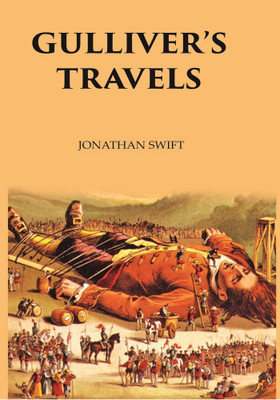Gulliver's Travels(Paperback, Jonathan Swift)
Quick Overview
Product Price Comparison
About The Book : The book is written in the first person from the point of view of Lemuel Gulliver, a surgeon and sea captain who visits remote regions of the world, and it describes four adventures. In the first one, Gulliver is the only survivor of a shipwreck, and he swims to Lilliput, where he is tied up by people who are less than 6 inches (15 cm) tall. He is then taken to the capital city and eventually released. The LilliputiansŌĆÖ small size mirrors their small-mindedness. They indulge in ridiculous customs and petty debates. Political affiliations, for example, are divided between men who wear high-heeled shoes (symbolic of the English Tories) and those who wear low ones (representing the English Whigs), and court positions are filled by those who are best at rope dancing. Gulliver is asked to help defend Lilliput against the empire of Blefuscu, with which Lilliput is at war over which end of an egg should be broken, this being a matter of religious doctrine. Gulliver captures BlefuscuŌĆÖs naval fleet, thus preventing an invasion, but declines to assist the emperor of Lilliput in conquering Blefuscu. Later Gulliver extinguishes a fire in the royal palace by urinating on it. Eventually he falls out of favour and is sentenced to be blinded and starved. He flees to Blefuscu, where he finds a normal-size boat and is thus able to return to England. About The Author : Jonathan Swift ( 1667 ŌĆō 1745) was an Anglo-Irish satirist, author, essayist, political pamphleteer (first for the Whigs, then for the Tories), poet, and Anglican cleric who became Dean of St Patrick's Cathedral, Dublin, hence his common sobriquet, "Dean Swift". Swift is remembered for works such as A Tale of a Tub (1704), An Argument Against Abolishing Christianity (1712), Gulliver's Travels (1726), and A Modest Proposal (1729). He is regarded by the Encyclop├”dia Britannica as the foremost prose satirist in the English language, and is less well known for his poetry. He originally published all of his works under pseudonymsŌĆösuch as Lemuel Gulliver, Isaac Bickerstaff, M. B. DrapierŌĆöor anonymously. He was a master of two styles of satire, the Horatian and Juvenalian styles. His deadpan, ironic writing style, particularly in A Modest Proposal, has led to such satire being subsequently termed "Swiftian".


